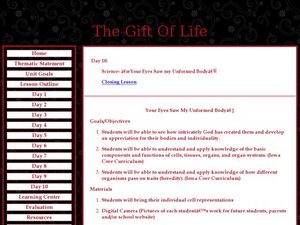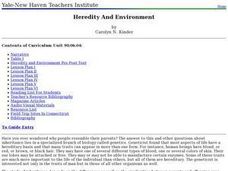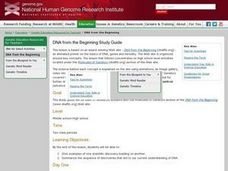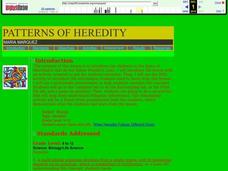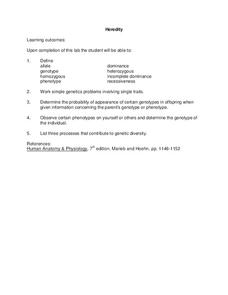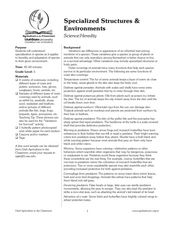Curated OER
Your Eyes Saw My Unformed Body: closing lesson
For those who teach and believe in Intelligent Design, this lesson is perfect. Religion students read and discuss Psalm 139: 1-18, and present their cell representation in class. They then watch a speech by Louie Giglio about the protein...
Curated OER
Look Alikes
Third graders compare and contrast the physical features of parents and offspring. For this life science lesson, 3rd graders classify a set of animal pictures according to their similarities. They share and explain their work in class.
Curated OER
Parental Genes
Eighth graders explore how different organisms pass their traits to their offspring. In this life science lesson, 8th graders differentiate recessive and dominant alleles. They predict the phenotype based on the genotype of an organism.
Curated OER
Paint's Family Tree
Students sort and classify the genetic traits of horses. In this heredity and genetics lesson, students read dialogue in a skit in which specific physical traits of several horses are described and a horse family tree is created....
Curated OER
Standard 4 Review Sheet-Genetics and Inheritance
For this genetics worksheet, learners answer a variety of questions about inheritance, DNA, the genetic code, genes, sexual and asexual reproduction, mutations, protein synthesis and genetic engineering.
Curated OER
Mendel and Meiosis
In this meiosis worksheet, students review Mendel's process of the passing on of traits to the next generation. This worksheet has 3 short answer questions
Curated OER
An Inventory of My Traits
In this biology activity, students identify and describe a number of easily observable genetic traits and compare the traits they have with other students. Then they identify and describe that some traits are common while others are not...
Curated OER
Heredity-Science Puzzlers, Twisters & Teasers
For this genetics worksheet, students complete 9 questions about heredity, genes, and alleles in the form of riddles, word scrambles, word puzzles, and brain teasers.
Curated OER
Heredity
Learners are introduced to the basic principles of heredity. Through discussion and discrimination activities, they review the role of chromosomes and distinguish between those traits that can and cannot be inherited. Students use...
Curated OER
Who am I and Why?
Students make comparisons about themselves and others, which are real and meaningful. They study some basic concepts in the area of genetics and do a complimentary series of experiments, or explorations that illustrate these concepts
Curated OER
Heredity And Environment
Students complete a pre-test on the relationship between heredity and the environment. As a class, they write down descriptions of themselves and identify which traits can be changed and not changed. In groups, they determine which genes...
Curated OER
The Cell
Students study the basic processes by which cells divide and transfer their genetic information. They recognize and distinguish possible inherited traits and through the discovery method of the facts and principles of inheritance. this...
Curated OER
Mendel and Heredity
Young scholars identify the investigator whose studies formed the basis of modern genetics (Mendel). They list characteristics that make the garden pea a good study organism, and summarize the 3 major steps of Mendel¿¿¿s experiment.
Curated OER
Mendelian and Non-Mendelian Heredity
Tenth graders discuss their physical features, and why they look the way they do. They listen as the teacher discusses DNA, alleles, and dominant or recessive genes. Students perform an experiment with different colored markers...
Curated OER
Heredity Mix 'n Match
Students randomly select jelly beans that represent genes for several human traits such as tongue-rolling ability and eye color. Then, working in pairs (preferably of mixed gender), students randomly choose new pairs of jelly beans from...
Curated OER
TE Lesson: What's Dominant?
Students study the number of chromosomes in the body cells, sperm cells, and egg cells of humans. They define allele, and examine the difference between dominant and recessive alleles. They complete an activity with jelly beans that...
Curated OER
DNA from the Beginning Study Guide
Students complete a study guide using a website which is an animated primer on DNA, genes, and heredity. The Web site is organized around key concepts. The web links and study guide are included.
Curated OER
Ecology - Reproduction and heredity
Students correlate signs of spring with reproductive strategies of varioius organisms. They describe how organisms inherit traits from generation to generation.
Curated OER
Patterns of Heredity
Students describe the differences between incomplete dominance and codominant alleles, and between multiple alleles and polygenic inheritance. They describe how internal and external environments affect gene expression. They then...
Curated OER
Heredity
In this science worksheet, middle schoolers find the answers to various types of heredity problems. They use the sheet to set goals for completing the unit.
Curated OER
Intelligence
In this psychology worksheet, learners answer 10 multiple choice questions related to intelligence, IQ and heritability of certain traits.
Curated OER
A Sputtering Image
Learners explain the role of genes in heredity. In this biology instructional activity, students predict the offspring's genotypes and phenotypes using the Punnett Square. They compute the probability of genotypes and phenotypes.
Curated OER
What is evolution and how does it work?
Students discuss the theory of evolution. In this evolution lesson, students discover Charles Darwin and his ideas of heredity, variation, and selection. This lesson gives information for the students to read.
Curated OER
Specialized Structures and Environment
Fifth graders read about how different animals protect themselves, and how characteristics give animals an advantage in their environment. Students then discuss a variety of "outer" wear for humans, and what they might choose to wear in...


